President Joe Biden spoke with Ukrainian President Volodymyr Zelensky for nearly an hour Wednesday as airstrikes near Kyiv seemed to bear out Western skepticism that peace talks could ease Russia’s assault on Ukraine.
Biden told his counterpart the US would provide Ukraine another $500 million in “direct budgetary aid,” the White House said afterward, and discussed “how the United States is working around the clock to fulfill the main security assistance requests by Ukraine.”
The US has repeatedly rebuffed Zelensky’s requests for more direct assistance, such as fighter jets and an enforced no-fly zone, and the White House made clear after the call it was no closer to supporting those steps. In the White House’s readout of the two leaders’ conversation on Wednesday, Biden sought to underscore the military assistance the US has been willing to provide and “the critical effects those weapons have had on the conflict.”
A day after Russia claimed it was scaling back its military operation near the Ukrainian capital, strikes continued in the suburbs of Kyiv as well as in Chernihiv, whose mayor said the city was under “colossal attack.”
American and Western officials, including Biden, had already voiced deep skepticism at Russian claims of de-escalation, noting its forces had already stalled in some places where it claimed to be pulling back. On Wednesday, the US revealed declassified intelligence showing Russian President Vladimir Putin has been misinformed by his advisers about the Russian military’s performance in Ukraine.
“One of the Achilles’ heels of autocracies is that you don’t have people in those systems who speak truth to power or who have the ability to speak truth to power. And I think that is something that we’re seeing in Russia,” Secretary of State Antony Blinken said during a visit to Morocco.
Administration officials were also cautiously watching ongoing peace talks between Russia and Ukraine, which both sides said were showing signs of progress after meetings in Istanbul. The US was less optimistic, saying it did not believe Putin and his underlings were negotiating in good faith.
After his call with Biden, Zelensky wrote on Twitter he had “shared assessment of the situation on the battlefield and at the negotiating table. Talked about specific defensive support, a new package of enhanced sanctions, macro-financial and humanitarian aid.”
The White House also said Zelensky “updated President Biden on the status of Ukraine’s negotiations with Russia.”
US officials have been working over the past weeks to ascertain what Zelensky’s objectives may be in the talks, including potential concessions. After the meeting in Turkey, the potential contours of a settlement emerged, including discussions about the status of contested regions, official neutral status for Ukraine and international security guarantees. A prospective meeting between Zelensky and Putin was also put on the table.
Yet a day later, Moscow downplayed any advances in diplomacy. Kremlin spokesperson Dmitry Peskov said there were no breakthroughs. And pessimism continued to pervade among Western leaders the talks could yield significant progress. The continued violence in Ukraine on Wednesday seemed to confirm US suspicions that Russia’s claims of de-escalation were nothing more than an attempt to deflect.
Biden’s phone call with Zelensky, which began just after 11 a.m. ET, is the first time the two men have spoken directly since the President’s last-minute trip to Europe for a NATO summit and meetings in Poland. Zelensky appeared virtually at the summit in Brussels, imploring leaders for scaled-up military assistance to help his military sustain the battle against Russia.
Ukraine’s military has performed well beyond expectations in keeping Russia at bay, though Russia has still inflicted massive destruction upon the country. Russian advances on Kyiv and Chernihiv had already stalled before Russia said this week it was de-escalating its military campaign in those areas.
On Wednesday, the White House said American intelligence findings show Putin is being “misinformed” by his advisers about how badly the Russian military is performing in Ukraine and the impact of sanctions on Russia’s economy.
“We believe that Putin is being misinformed by his advisers about how badly the Russian military is performing and how the Russian economy is being crippled by sanctions because his senior advisers are too afraid to tell him the truth,” White House communications director Kate Bedingfield said during a daily briefing.
The US also has information indicating that Putin has become aware of the misinformation, leading to a rift between the Russian leaders and his top defense officials.
Bedingfield said there was now a “persistent tension” between Putin and members of his military leadership.
“It is increasingly clear that Putin’s war has been a strategic blunder that has left Russia weaker over the long term and increasingly isolated on the world stage,” she said.
This intelligence may help explain why Putin rejected a slew of diplomatic off-ramps the US and other countries offered Putin in the run-up to his invasion of Ukraine, believing that the Russian military would be able to quickly overwhelm Ukraine.
The official declined to provide additional examples of Putin being misinformed by his advisers, saying that information remains classified. The US intelligence community declassified and downgraded the summary of its findings but not specific intelligence to protect sources and methods.






